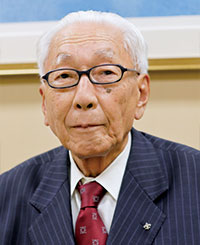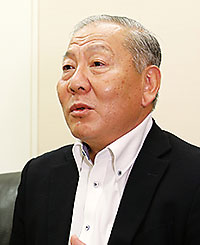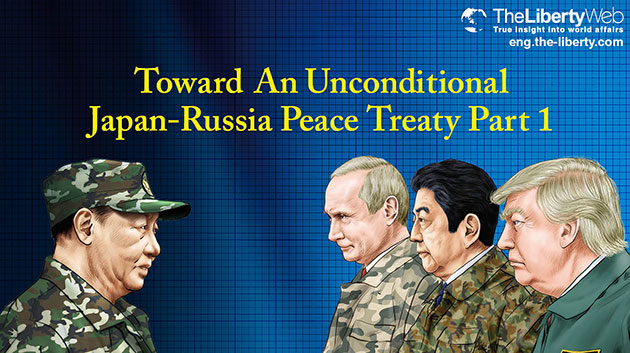A U.S.-Japan-Russia Alliance To Stop China
Toward An Unconditional Japan-Russia Peace Treaty Part 1
This month we will be starting a new column called The Nation-Building Project that will look at the how Japan ought to manage its politics. This first installation will look to diplomacy and security.
U.S. President Donald Trump is now changing the world order. What is Japan’s ideal for future diplomacy and security in a world of continuing trade war between the U.S. and China?
The year 2018 will come to be known as the first year of the U.S.-China trade war — and the new Cold War began with Trump’s speech at the UN general Assembly and Vice President Mike Pence’s recent lashing out at China.
“The United States lost over 3 million manufacturing jobs, nearly a quarter of all steel jobs, and 60,000 factories after China joined the WTO . . . But those days are over. We will no longer tolerate such abuse,” Trump said at the 2018 UN General Assembly.
In October, Pence spoke at the Hudson Institute disclosing his hardline stance against China.
The Chinese Communist Party has also used an arsenal of policies inconsistent with free and fair trade, including tariffs, quotas, currency manipulation, forced technology transfer, intellectual property theft, and industrial subsidies that are handed out like candy to foreign investment. These policies have built Beijing’s manufacturing base, at the expense of its competitors . . .
But our message to China’s rulers is this: This President will not back down. The American people will not be swayed.
Trump imposed fresh tariffs on around $200 billion of Chinese goods, making the tariff extend to half of all Chinese imports. Congress passed a bill to finance infrastructure development in developing countries as a counter-measure against China’s “One Belt, One Road” policy. The U.S. navy also plans to reinforce patrols in the South China Sea.
The U.S., Mexico and Canada signed the USMCA agreement as a prohibition from making trade agreements with countries that do not have a market economy. The U.S. is in the process of including these terms in her other trade agreements. China is being pushed out of the global economy.
The U.S.-Russia Common-Goal Alliance
The U.S. is shifting the world order from the aftermath of the Cold War stance against Russia to a new Cold War stance against China. The new national strategy is to assume a grip over China, not Russia.
Both countries have been secretly cooperating since last year’s strike against radical Islam groups.
In the G7 Summit in June, Trump commented in private on Russia’s annexation of Crimea saying that Crimea belongs to Russia and the residents all speak Russia.
Trump and Putin had a two-hour long talk in July, giving the impression that the cold relations were about to thaw. Perhaps they came to an agreement for Russia to contribute to the counter-China strategy in exchange for relaxing sanctions that began when Russia annexed Crimea.
U.S. diplomat Henry Kissinger also recommended that Trump seek Russia’s help in countering China. Back during the Cold War, Kissinger advised the then President Richard Nixon to cooperate with China to surround the USSR, and actually went to China for negotiations. This time his advice is the opposite of the Nixon strategy, and will bring about a fundamental change in the world order.
If the U.S. and Russia join hands it will complete the conditions for defeating China.
Congress, however, is still primarily anti-Russia. Republican Senator Rand Paul is one of the very few Senators working to improve U.S.-Russian relations.
Congress still thinks of Russia as a hypothetical enemy and the press is criticizing Trump for holding talks with Putin, alleging the Russian suspicion of intervening in the 2016 U.S. presidential elections, trying to justify sanctions.
While it is true that many of us are uneasy about Russia, what is happening in the world now is the battle of predominance between the U.S. and China. Russia holds a very powerful key to deciding the victor. It would be dangerous if Russia joins China and their ‘colonization’ of Asia and Africa.
Yoshida Doctrine Spell
Turning to Japan, it is obvious that they must revise the post-war policies of diplomatic and security dependence on the U.S. Ever since PM Shigeru Yoshida, Japan has protected their “economy first, weapons last” principle (the so-called Yoshida doctrine).
Japan’s military dependence on the U.S. limits their diplomacy within the bounds of American opinion: namely, in this case, the anti-Russian stance. In other words, Japan thinks that they can entrust their diplomacy and national safety to the U.S. and instead focus on prioritizing economic growth.
When President Obama said to take a strategic position of patience for North Korea, Japan waited patiently and ran away from making any clear-cut diplomatic or national safety decisions. The result? North Korea became a greater nuclear threat.
As we can see from Japan’s failure to come up with an effective policy to suppress North Korea’s military threat, the Yoshida doctrine is the root cause of Japan’s crisis.
Since it was Trump’s initiative to steer against China, if he steps down the U.S. will not be able to maintain their current hardline stance against their strategic competitor.
Trump bemoaned the fact that Japan, a “country of samurai warriors,” is hiding behind U.S. defenses. Japan must become independent. Trump’s urges should be seen as an opportunity to finally establish an independent state strategy.
And what better event to mark the new step forward than an alliance with Russia?
Pence’s Speech to Contain China
Over the past 17 years, China’s GDP has grown nine-fold; it’s become the second-largest economy in the world. Much of this success was driven by American investment in China.
In Xinjiang, the Communist Party has imprisoned as many as one million Muslim Uyghurs in government camps where they endure around-the-clock brainwashing.
As history attests though, a country that oppresses its own people rarely stops there. And Beijing also aims to extend its reach across the wider world.
Beijing has mobilized covert actors, front groups, and propaganda outlets to shift Americans’ perception of Chinese policy.
Photograph:
Vice President Mike Pence outlines the administration’s hardline policy toward China during remarks at the Hudson Institute.
Russia: Japan’s Friend or Foe?
There is an ongoing territorial dispute between Japan and Russia, and things cannot remain this way.
As the hitherto cool U.S.-Russia relations begin to thaw, Putin decided to pass a ball to Japan.
At the Eastern Economic Forum that took place in Vladivostok last September, Putin approached Japanese PM Abe with an offer to sign an unconditional peace treaty.
The majority of Japan’s public reacted disapprovingly against signing any deal until the disputed islands are returned. Is this diplomatic approach going to be effective in the current age of the U.S.-China Cold War?
The Territorial Dispute Born from the Cold War
Back in 1951, when Japan signed the Treaty of San Francisco with the Allied powers, the USSR did not agree to sign. With the emergence of the territorial dispute, the state border remains undefined.
When the dispute first started, Japan was only concerned about the return of the Habomai and Shikotan islands. But then the U.S. pressured them into insisting on all four islands being returned.
Here’s how it happened. Stalin’s death in 1953 gave both countries an opportunity to fundamentally revise their relations, and Japan again agreed on the return of just two islands. Then the U.S. Secretary of State John F. Dulles intervened. He threatened that if Japan gives up on the Kunashir and Iturup islands, the U.S. will be entitled to perpetually occupy Okinawa according to the San Francisco agreement, Article 26.
In other words, he threatened Japan by taking Okinawa hostage. So, this explains Japan’s contradictory next move. While on the one hand Japan agreed to have two of the islands returned by signing the Soviet-Japanese Joint Declaration of 1956, they also began to claim that the USSR was unlawfully occupying the other islands.
What was behind America’s pressures were the beginnings of the Cold War. In fact, the whole purpose of the Treaty of San Francisco was to make Japan a U.S. protectorate. Adding fire to the territorial disputes was the U.S. method of preventing Japan’s reconciliation with the USSR. It was a way of controlling Japan.
Public Sentiment Incongruous Between Japan and Russia
Another thing hindering a swift signing of a peace treaty between Japan and Russia is the incongruity in public sentiment between the two countries.
A good example of Japan’s negative opinion of Russia is the idea that, after Japan consented to the Potsdam Declaration, the USSR broke the Neutrality Pact and invaded Japan’s northern islands. Japan has long thought that Russia is an untrustworthy country.
On the other hand, Russia claims that at the Yalta Conference in February 1945 they formally joined the U.S.-U.K. in the war against Japan and invaded the islands in August. If we look at the dates, Japan consented to the Potsdam Declaration on 15th August 1945, but it was only signed on 2nd September 1945.
Since a war is not formally ended until the surrender proclamation is signed, the USSR’s military move was perfectly legal, not to mention that the Allied Powers agreed to the maneuver. Thus is Russia’s justification for controlling those islands.
In addition to the territorial problem is the problem of the USSR’s postwar internment of many Japanese people in Siberia. Russia, on the other hand, paid for their WWII victory with the loss of over 25 million soldiers and civilians. The islands are nowhere near enough to compensate for their losses.
For Russia, Japan is a country that lost the war. Losing territory is a natural outcome of losing a war, and history tells us that regaining lost territory is almost impossible without spilling further blood. To Russia, the territorial dispute itself is a ridiculous notion.
Troops in Their Backyard
But perhaps the greatest hindrance to the return of those islands is that the U.S. will probably station troops on them.
If Russia returns those islands, they will be subjected to the U.S.-Japan security treaty and the U.S. will most likely build a military base there. For Russia, it will be like having U.S. troops in their backyard.
Russia is also wary that while Japan remains bound by the Yoshida doctrine, they will be susceptible to U.S. diplomatic control, just like John F. Dulles did.
So, it is clear that U.S. influences and the incongruity in public sentiment between the two countries are creating an impervious obstacle that is stopping the peace treaty from going forward.
But a new age calls for new strategies. Japan must break free from the Yoshida doctrine, stop looking to the U.S. for permission, and establish a flexible diplomacy that works to the nation’s interests.
The Liberty Web interviewed three critics on their opinions about how to create a constructive Japan-Russia relationship for the future.
Photograph: Putin suddenly proposes an unconditional peace treaty with Japan in the presence of Chinese President Xi Jinping. Was he implying an intention to form counter-China connections with Japan?
Territorial Disputes the Base Argument for the Liberal Democratic Party
Expert’s Insight Interview
The Liberty Web interviewed a Trans-Siberian railway aficionado about why Russia does not trust PM Abe

Eiichi Yamaguchi
Chairman of the Committee for the Internationalization of the Tran-Siberia Railway (Japan)
Born in 1929, in Tokyo, Yamaguchi graduated from Keio University before working at the Ministry of Justice and later Hitachi. He is now a consultant in global development. He has numerous publications in Japanese on the topic of Russia.
What is important in the unconditional peace treaty is whether Putin really trusts Abe. They have met 22 times, and even formed an agreement for economic cooperation in 2016. But after putting part of it into action it was left in limbo.
PM Abe has been telling his people that he is working towards having those islands returned, but he is actually just using the territorial dispute to protect his position in office. Getting all four islands returned is impossible: we have to compromise with just two.
It may be possible if Japan passes a bill prohibiting the U.S. from building military facilities on Kunashir and Iturup islands, but the politicians don’t have that courage.
Carrying Natural Resources via The Trans-Siberian Railway
Japan should economically cooperate with Russia. There are many resources that Japan needs that lie underground in Russia. The only thing they don’t have is rare-earth metal. Japan doesn’t need to obey the U.S. and import oil from the Middle East: we can just import it from Russia.
For Japan to gain Russia’s trust, we must start work on underwater tunnels connecting Russia, Japan and the U.S. across the Strait of Tartary, Bering Strait and La Perouse Strait. In 2016 Russia proposed to Japan an economic cooperation project with 68 entries, and one of them was a railway connecting Hokkaido and Sakhalin Oblast.
If we can import Russia’s natural resources via the railway, it would be faster and cheaper than shipping them.
Also, in general Russia is more advanced in space research than the U.S. And space development requires rare metals like nickel and titanium. So far Russia is the only country that has the technology to put titanium coating on carbon fiber. Japan and Russia could cooperate in the space area too.
Russia and China’s Sham Marriage
Expert’s Insight Interview
What is the true nature of the Russia-China relationship? Here is the view from the Russian side

Dmitri V. Streltsov
Japan Studies Expert and Professor at Moscow State Institute of International Relations
Born in 1963, Streltsov obtained a Ph.D. in History at the Moscow State University. He specializes in political science and Japan studies. He has been a visiting researcher to numerous Japanese universities including Hitotsubashi University. He is chairman of the Association of Japanologists.
From the Russian perspective, Japan is pursuing an unrealistic ideal in trying to get those islands back. In the Soviet-Japanese Joint Declaration of 1956, the USSR agreed to return the Habomai and Shikotan islands to Japan upon signing a peace treaty. Putin intends to fulfill that duty.
People interpret a peace treaty to mean different things. The best outcome would be to form a treaty of peace and friendship as an intermediate solution to improve investment and economic cooperation relations before stepping into the territorial agreement.
But Japan thinks of a peace treaty to mean an agreement to resolve the territorial disputes that arose after WWII. This idea will not lead to the improvement of the Russian-Japan relations.
Russia is not so concerned about the U.S. building military facilities on the islands. It wouldn’t be much different than having facilities in Hokkaido. But if they do build it, it would have symbolic meaning, and so the Russian people will not be pleased.
No Expectations and No Intimacy With China
Russia began to strengthen relations with China, thinking that we could use China in our conflict with the West. That mirage has faded.
But realistically speaking, Russia is still dependent on China: linking the Eurasian Economic Union with their “One Belt, One Road”, and exporting weapons and energy resources to them. But we have no choice since the West has imposed sanctions on us.
This does not mean, however, that the Russian people feel any intimacy with the Chinese. If anything, the sort of partner Russia desires is one that is more plural, and can become a gateway to cooperation economic deals with the rest of Asia. That partner has not appeared.
Russia is also strengthening military connections with China. The two countries had joint exercises in September this year, and this served the dual function of promoting patriotism to the Russian people and sending a message to the West.
In other words, Putin is saying, “If you intensify sanctions, we will further strengthen our military relationship.” I am aware that this would be a bad outcome for the West.
But I think it is unlikely for Russia to form a military alliance with China. China has many problems, and Russia does not see any hope in that country. But it is still likely that they will continue to advance military and technology cooperation.
On the one hand, Russia and China are uniting, and on the other hand they are wary of each other. Russia is trying to avoid overdependence on China.
The Abe-Putin Peace Treaty
Russia wants to create a pipeline with countries like Japan, South Korea and India to establish a balanced diplomatic strategy.
Currently the Japan-Russia economic relationship stands on shaky ground. The reason why cooperation is at a standstill is partly due to the lack of appeal in Russia’s investment environment. Russia is a country that is not an attractive investment, so that is an area that needs improvement.
If the Japan-Russia peace treaty is signed, it will serve as an indirect signal for China. Russia will no longer have to lean towards China, but will create a friendly relationship with an important partner like Japan. Russia will be able to engage in balanced diplomacy.
In Russia, there are no politicians who can replace Putin, so the stories about his support rate dropping means nothing compared to the other politicians. We can expect Putin’s tenure to continue for quite some time.
Putin and Abe are in their honeymoon phase. If either of them are replaced, the Japan-Russia relationship will surely hit the ground, hard. I hope that both of them will achieve good results while they are still in office.
Immediate Agreement to Japan-Russia Peace Treaty Is The Correct Military Decision
Expert’s Insight Interview
How does a former JSDF Commanding General see the Japan-Russia relationship?

Kazuhito Mochida
Former Commanding General of the Western Army
Mochida was born in 1952 in Fukuoka, Japan. After graduating from the National Defense Academy of Japan, he served as Training Manager at the Ground Staff Office, Manager at the Joint Staff Office, and Commander of the 7th Division. He is a former Commanding General of the Western Army, and is currently a senior researcher at the Security and Strategy Research Institute of Japan. He has authored a book on the potential of war between Japan and China.
In military terms, Japan should immediately agree to President Putin’s offer of an unconditional peace treaty. Japan will not be able to have a broader view unless we abandon the post-Cold War notion of territorial resolution.
The U.S. is pressuring North Korea to discard their nukes after which Japan will have to face the enemy boss, China. What we absolutely have to avoid is facing a second enemy, Russia. We have to form a deal with Russia to safeguard our rear: this is a basic military strategy.
If anything, Japan should form a military partnership with Russia to counter China. For this to happen it will be necessary to convince the U.S. to not station troops on Hokkaido aside from during military practices.
Russia has anti-submarine and surface-to-air missiles on those disputed islands, and we have to request – perhaps in secret – for Russia to turn them around not to face Japan and the U.S., but to face China. To achieve this Japan should invest in the Tran-Siberian railway to break off its connection with China’s “One Belt, One Road” strategy, and establish economic relations with Russia.
Cyber and Electromagnetic War
Whatever the global circumstances, China’s expansionism will continue. The Korean Peninsula is also unstable. Either way, Japan is positioned in the worst environment strategically.
Until now Japan has been increasing their naval and air budgets to engage in a symmetric strategy [navy versus navy, air force versus air force] but this is a mistake. They have little to no understanding of how China fights.
China’s first strategy is to win without fighting via an intelligence war. Manipulate public opinion to their favor to strip the U.S. and Japan of any will to fight. Then they will wreak havoc in the state system and infrastructure by launching cyberattacks, simultaneously deploying naval forces to occupy seaports.
Then they will use drones and long-range missiles and deploy old submarines and fighter jets for a concentrated attack. And just when we think “its’ over”, they will use state-of-the-art submarines and fighter jets. This is where China starts going full on, but will Japan have any military power left?
How can Japan defend itself? We need a weapon that can sink ships and uses electromagnetic power.
Current warfare has changed from shooting bullets to new forms: cyberattacks, space warfare such as using laser weapons against satellites, and electromagnetic warfare.
For example, Russia’s electromagnetic vehicle weapon neutralizes artificial satellites and enemy AWACS’s. Russia also has microwave weapons that can neutralize electronic equipment such as drones and missiles.
Japan must quickly arm itself with weapons that are capable of destroying the enemy’s “brain”. These weapons don’t run out of ammunition and cost less than normal missiles. The country’s survival depends on whether they can include these weapons in their next year’s budget. The JSDF must also take into account these new forms of warfare when devising strategies.
Time To Regain Sovereignty
The reason behind stagnant Japan-Russian relations and the pitiful defense situation is because Japan has maintained its post-war attitude of abandoning sovereignty: the idea that a country must protect itself. The Yoshida doctrine does not consider the Self-Defense Force to be an army, and demands that the defense be limited to less than 1% of the GDP. We must break free from these chains. We must also revise our blind diplomatic obedience to the U.S.
It is about time that Japan becomes a country with the common sense to protect itself and decides its own fate.
Related
- Japan's Innovation of Post-War System Will Stop China's Menace
Toward An Unconditional Japan-Russia Peace Treaty Part 2 [Conclusion]



















